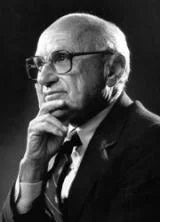Milton Friedman Won 1976 Nobel Prize for Analysis of Monetary Policy and Its Effects

Milton Friedman, a member of the NBER research staff, won the Nobel Memorial Prize in Economic Sciences in 1976 “for his achievements in the fields of consumption analysis, monetary history and theory and for his demonstration of the complexity of stabilization policy.”
Friedman’s best-known contributions were in the realm of monetary economics. His monumental work with NBER Research Associate Anna Schwartz, A Monetary History of the United States, 1867–1960, provided important support for monetarism. Friedman promoted the theory that changes in the money supply affect real economic activity in the short run and the price level in the long run. A leading advocate of free markets, he won international attention for his 1962 book Capitalism and Freedom.
At the time of the award, Friedman was the Paul Snowden Russell Distinguished Service Professor of Economics Emeritus at the University of Chicago.
More information on this Nobel laureate


